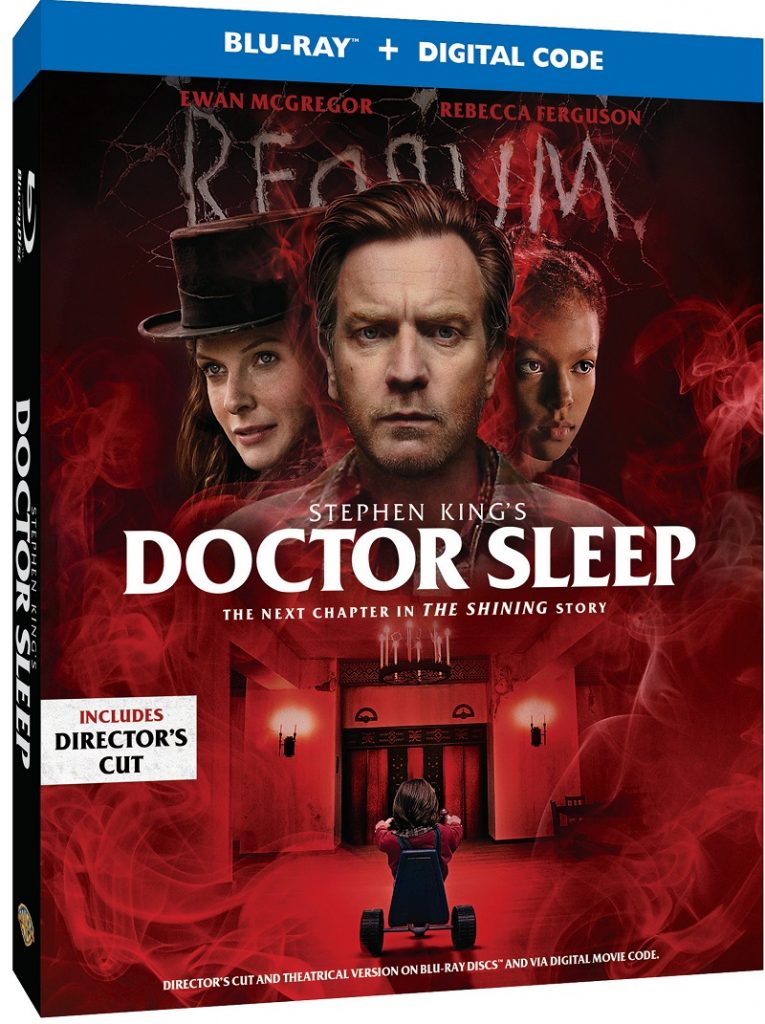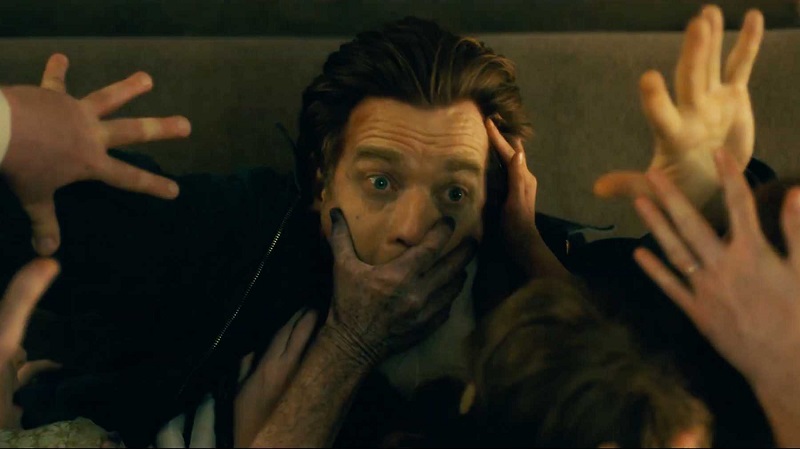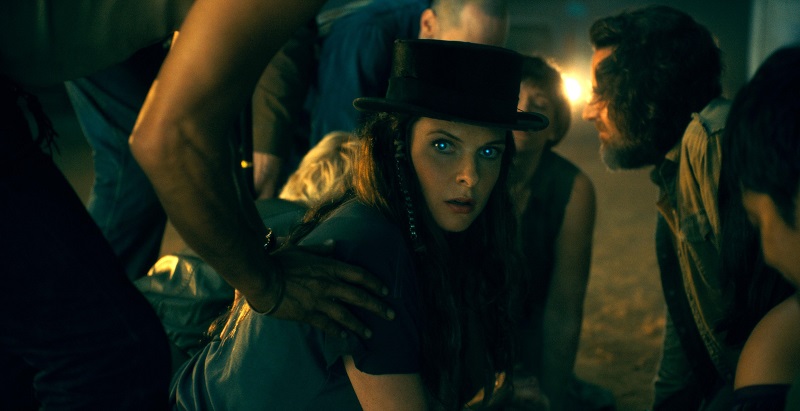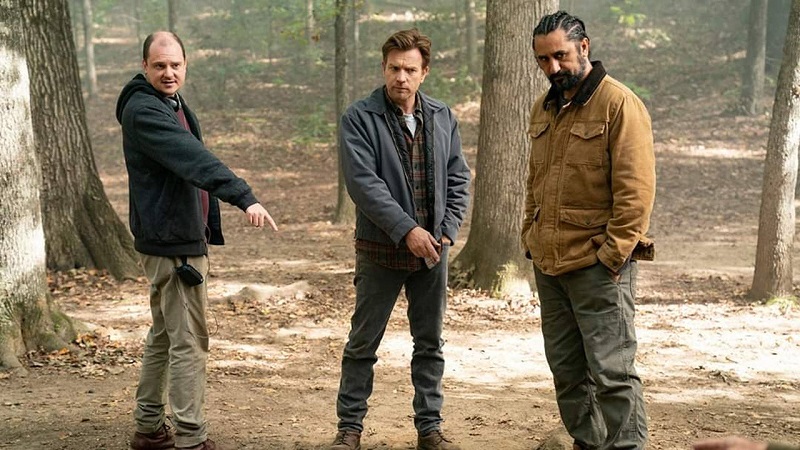Mike Flanagan wrote and directed Doctor Sleep, from the riveting literary sequel to The Shining by Stephen King. After the greatness achieved by Flanagan with his instantly iconic take on The Haunting of Hill House, the King of Horror’s beloved follow-up to one of the most treasured horror properties in pop culture history, was firmly in good hands. The film, that was one of The Movie Mensch’s top 19 of 2019, is out now on DVD, Blu-Ray and digital download formats.

After witnessing the Ewan McGregor starring stunner, we can proudly describe the electrically engaging film as the most precious of gifts to longtime fans of both the 1977 King masterpiece and the enduring Stanley Kubrick 1980 cinematic classic.
Danny Torrance has had a rough go of it. Given the events of his childhood, who could blame him for self-medicating as long as he was old enough to secure libations. His father, Jack (Jack Nicholson), took his wife Wendy (Shelley Duval) and their son (Danny Lloyd played the supernaturally gifted young boy) to Colorado’s Overlook Hotel to watch the establishment for the winter while Jack finished his latest book. Instead of a blissful getaway for mom and son while dad balanced work and play, Danny’s world fell apart like a wood door being struck repeatedly by an axe. He and his mother would escape, Jack would freeze to death and demons would have to be dealt with for some time.
As we meet Danny, he is drinking heavily and although it numbs the pain, it does nothing to quell the haunting visions he still experiences. It is only when he “meets” Abra Stone (Kyliegh Curran), that the now in his 40s man will find something other than a reoccurring nightmare that doesn’t care whether you are awake or asleep. As teased in the Doctor Sleep trailer, Abra and Danny communicate through the blackboard wall that is in his new apartment. She is another supernaturally gifted soul, the first he’s met in a while. Danny’s esoterically overwhelming feelings of being alone with this “gifts” are lifted as soon as Abra enters the landscape of Doctor Sleep. The way that Flanagan captures this immediately welcomes the audience into a world that stands on its own beyond the halls of The Shining. It’s a fascinating endeavor that the filmmaker has undertaken.
The Shining movie is considered one of those films that is simultaneously studied in film schools for its bombastic brilliance and appreciated by generation after generation as a hallmark moment in a horror milieu journey for any film fan. Yet, it was notoriously loathed by the author for the liberties that Kubrick took with the source material. What is so fascinating about the thread the needle balance that Flanagan strikes is that both camps in The Shining page to screen debate are united in the reverence that Doctor Sleep’s filmmaker holds for both entities. That utter adoration for film and novel matches the core passions of countless souls who treasure each popular culture hall of fame entry for their own unique sensory responses that are elicited from King’s pages and Kubrick’s lens.
At the center of that is the performance of McGregor. He is a bridge in a myriad of ways. The entire film rests on his supremely capable shoulders. The Scottish actor delivers a nervously nuanced turn that feels like he has been absorbing Danny innately since he first saw The Shining. Lloyd’s child actor is a rich launching pad for bringing this character to life from the pages of King’s Doctor Sleep. As the film commences, he is awash in a self-induced haze. But his character arc becomes one that actor’s treasure. Once he finds a shred of peace, his powers reveal what—he believes at the time—is his purpose. It plays into the title of the book and film and is the most emotionally stirring and satisfying character development that can only come from the marvelous mind of King. It seems a wild stretch to think of the world of The Shining and ever imagine that tears would be flowing down one’s face from something Danny delivers in the sequel. It happens, and its beyond blissfully satisfying on so many levels.
It also opens the door to the approaching terror that is hardly finished with Danny Torrance.
Rebecca Ferguson has slowly, but surely, established herself as one of the most “makes it looks easy” gifted actresses of her or any generation. From her seismic turn as Isla Faust in Mission Impossible: Rogue Nation and then Mission Impossible: Fallout to her angelic singing sensation that was her take on The Greatest Showman’s operatic Jenny Lind, there is a vastness to her talent. Her turn as Rose the Hat in Doctor Sleep takes us to a whole nether galaxy of gifts. Without ever getting overtly physical with vast movements that other thespians would employ to convey her possession of some otherworldly force, Ferguson terrorizes us with seemingly simple wistful facial reactions and a welcoming horror to her personification that haunts profusely. She gives the most mesmerizing of performances that should go down right alongside Nicholson’s in horror lore in terms of its lasting legacy.
Matching her in the adversarial department is Curran. The fantastic find is set up to be on a collision course with Ferguson’s Rose the Hat and much of the them has us believing that the little girl may just have Rose’s number. But, thankfully, that all goes out the window when Danny and Abra arrive at the Overlook Hotel for what they both know will be a final foray into evil versus good for the ages. It’s fitting that The Shining and Doctor Sleep find all roads leading to the haunted Colorado mountaintop hotel with all those truly pissed off and put off spirits. Curran and Ferguson have a yin and yang cinematic chemistry to them that the young actress catapults back to her scene partner throughout the film in the most powerfully piercing ways. In between them is Danny, who commences things as what we believe is a mentor to Abra, but by the end of the film, they may be more equals at the least and at the most have audiences wonder who the mentor is and who is the mentee.

The realness of the approaching horror in lives lost is immeasurable. There is a palpable sense to the terror Rose the Hat and her followers are bringing to the world. Every single one of us is an expandable piece of collateral damage as her thirsty quest to inhale all that is supernaturally special in the world, all for her own personal powerful gain. Flanagan paints that aspect of Doctor Sleep in a way that is riveting, horrifying and above all else—intensely soul crushing.
Bridging the worlds of The Shining, what with shots in Doctor Sleep of flooding elevators, terrorizing twins in matching baby blue and white outfits, how Flanagan merges these entities is nothing short of brilliance incarnate. The filmmaker has the deftest of command of the material, one can see why King was so taken with him and got behind his filmmaking effort of bringing Doctor Sleep from his pages to the screen, as opposed to the effort of that other guy. Flanagan also has a way with his actors that we saw in The Haunting of Hill House in that he brings out the emotive spectrum in them in a manner that befits the character, the scene and the overall arc and tone of the film. It’s a stunning gift.
McGregor and his career-long gift to us all continues with his latest and it could not have been an easy endeavor. Danny, although young in The Shining, has become somewhat of an iconic character. Try imagining that film without having him riding his three-wheeler through the halls or him running through the icy maze at the end? You can’t. Therefore, the Scottish actor is undertaking what could have been a thankless role and instead turns it into a powerful force of nature that exposes the frailty of addiction, parental neglect and abuse and how that can turn into a lifelong affliction. It is one that the actor handles with grace, but still with a panache and command that demands our full attention and strong emotional investment.
This is a hero character, for there is no debate. In this ultimate battle of good versus evil, Danny recalls in many ways a character like Gandalf or Obi Wan, what with his sage insight into The Shining and its power for the positive and its misuse by dark forces. Danny’s mere presence always means there’s hope for those struggling to battle the demons of the world. Who would have thought that that little boy at the Overlook Hotel would have the potential to serve as the crucial stop gap to the ultimate incarnation of evil.

When it comes to bonus features, the first thing that must be addressed is the director’s cut. If you haven’t seen the film yet (i.e. theatrically), dive into the director’s cut first as it is and feels the most closely aligned with what the helmer was trying to do—but didn’t get to due to any number of constraints that had him releasing what audiences got (and loved) in theaters. If you have already seen the theatrical version, then definitely start your Doctor Sleep home video experience with the Flanigan cut, which includes 30 minutes of never-before-seen footage that adds greatly to an already awesome story.
The featurette The Making of Doctor Sleep: A New Vision is everything one wants from a home video extra, especially considering it includes exclusive insight from the man who invented this world (and dozens of others we wholeheartedly adore). King, along with Flanagan, McGregor, Ferguson, Curran, producer Trevor Macy and costume designer Terry Anderson discuss everything from thoughts about what Danny Torrance’s storyline would, could and should be, the vast challenges that littered Doctor Sleep’s development process, and Flanigan shares a fun little story about sending his script to the king, er, King. This bonus feature could have gone on forever. Instead when it concluded just shy of 14 minutes, I was left wanting more. Much more.
Lucky for us, Return to The Overlook added layers upon layers of enrichment to the entire Doctor Sleep experience and kept the stellar behind-the-scenes magic flowing. This time, Flanagan and company divulge their first experiences with the 1980 Kubrick classic and the effect it had on them as budding artists. The Overlook Hotel’s construction and recapturing is a downright mesmerizing aspect of this featurette as well. Also covered here is how the production secured some iconic props and a delightfully discerning discussion emerges where all involved define imitation versus homage. Both items are integral to the virtual and literal construction of a sequel or follow-up to an iconic piece of cinematic history. The set tour is rather nice as well.

Lastly, King and Flanagan get together once more for a magnificent chat about the pratfalls and inherent dangers of updating such a beloved institution that is The Shining and how King’s 2013 book was a bold, gutsy and wickedly brilliant way to continue a story decades in the haunting. Both creative types keenly appreciate the other and hearing their back-and-forth is a true gift of the highest order.
Film Grade: A
Bonus Features: A

